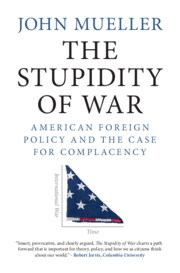Book contents
- The Stupidity of War
- The Stupidity of War
- Copyright page
- Dedication
- Contents
- Figures
- Acknowledgements
- Additional material
- Prologue The Rise of War Aversion and the Decline of International War
- Part I Assessing the Threat Record
- Part II Evaluating Present Threats
- 6 The Rise of China, the Assertiveness of Russia, and the Antics of Iran
- 7 Proliferation, Terrorism, Humanitarian Intervention, and Other Problems
- 8 Hedging, Risk, Arrogance, and the Iraq Syndrome
- Afterword Aversion to International War as an Explanatory Variable
- Appendix: A Sardonic Litany
- Notes
- References
- Index
7 - Proliferation, Terrorism, Humanitarian Intervention, and Other Problems
from Part II - Evaluating Present Threats
Published online by Cambridge University Press: 01 March 2021
- The Stupidity of War
- The Stupidity of War
- Copyright page
- Dedication
- Contents
- Figures
- Acknowledgements
- Additional material
- Prologue The Rise of War Aversion and the Decline of International War
- Part I Assessing the Threat Record
- Part II Evaluating Present Threats
- 6 The Rise of China, the Assertiveness of Russia, and the Antics of Iran
- 7 Proliferation, Terrorism, Humanitarian Intervention, and Other Problems
- 8 Hedging, Risk, Arrogance, and the Iraq Syndrome
- Afterword Aversion to International War as an Explanatory Variable
- Appendix: A Sardonic Litany
- Notes
- References
- Index
Summary
Current threats might include in particular the proliferation of nuclear weapons and terrorism as well as international crime, policing the oceans, the antics of cybergeeks, securing energy sources, climate change, economic challenges, and the protection of allies. Singly or in groups, these problems and issues scarcely justify the maintenance of a large military force in being, and complacency is, in general, a more fitting response than agitated, and particularly militarized, alarm. Proliferation has been of little practical consequence, and alarmed efforts to prevent it have proved to be very costly and may hamper the forging of a permanent normalization in Korea. Counterterrorism policy has been driven primarily by public opinion, not by an apt analysis of the threat. Cybergeeks may be able to commit sabotage, steal intelligence, or spread propaganda, but any military disruptions are likely to be minor and call more for a small army of counter-cybergeeks than for a large military. One possible use of American military forces in the future would be to deploy them under international authority to police destructive civil wars or to depose vicious regimes. However, this would not require a large number of troops and is unlikely to become routine.
Keywords
- Type
- Chapter
- Information
- The Stupidity of WarAmerican Foreign Policy and the Case for Complacency, pp. 168 - 192Publisher: Cambridge University PressPrint publication year: 2021

